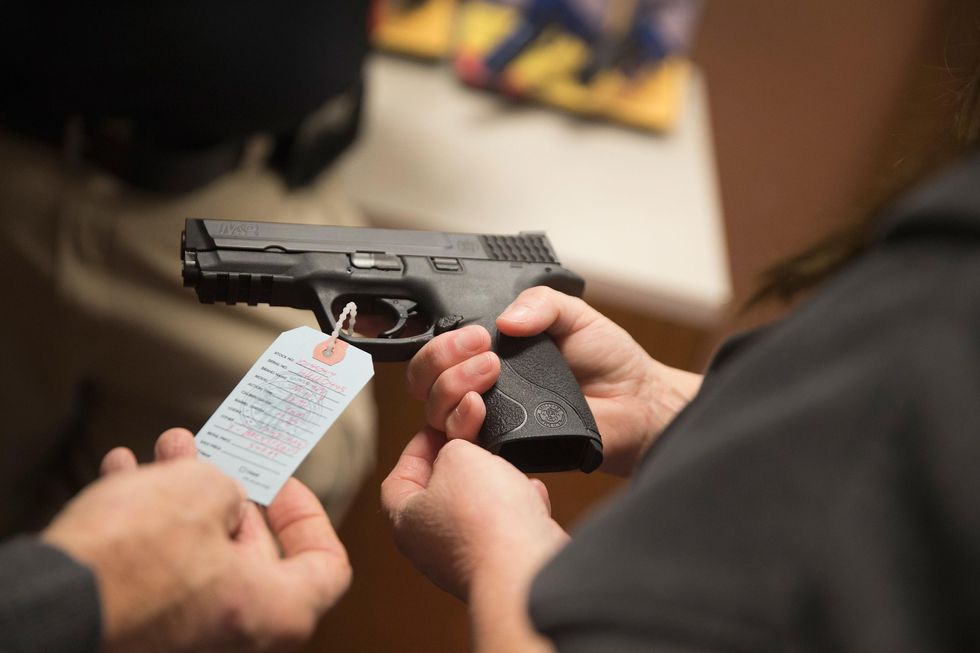Gun control advocates argue that more regulations on firearms will decrease gun violence in the United States. Relinquishing liberty for increased safety is a worthy trade-off, they argue.
However, if the mass killing in Jacksonville on Sunday provides clues as to the validity of such arguments, an objective observer might conclude that increased gun laws are not as effective as advertised.
What are the facts?
First, law enforcement revealed Sunday the Jacksonville killer was not from Florida. In fact, he lived in Baltimore and was in town competing at the Madden Football tournament that he late shot up. Jacksonville Sheriff Mike Williams also revealed the killer used a semiautomatic handgun.
Then on Monday, court filings obtained by The Associated Press revealed the killer was previously hospitalized for mental illness and was prescribed both anti-depressant and anti-psychotic medications.
What does this mean?
Despite the killer's history of mental illness, he was still able to obtain the firearm used in Sunday's tragedy. That means he successfully passed Maryland's rigorous process for purchasing handguns.
That process includes being fingerprinted by the Maryland State Police, completing a satisfactory firearms safety course, obtaining a Handgun Qualification License from the MSP, completing a background check with the Bureau of Alcohol, Tobacco, Firearms, Explosives, then submitting their HQL to the federally licensed firearms dealer they wish to purchase from.
Then a purchaser must wait a minimum of seven days before completing their handgun purchase.
Indeed, the process is meant to both weed out those not serious about safely owning firearms and those legally ineligible to purchase or possess firearms. It's a difficult process, one lauded by Democrats and gun control advocates, but one that failed too many people in just a matter of minutes.
Not only is the handgun purchasing process difficult in Maryland, but the state overall is not friendly toward the Second Amendment. In fact, a recent study from the CATO Institute found that Maryland is the 46th worst state for freedom-loving gun owners. Only New Jersey, Massachusetts, Hawaii, and California were found to have more stringent gun control laws.
Also, federal law and Maryland state law prohibit certain individuals, including those with a history of mental illness, from purchasing or possessing firearms. Though it's known the killer spent time in a mental facility and used mental illness medication, the details of his mental illness have not been made public.
It's not yet known whether the killer received a physician's waiver to purchase his firearms lawfully, a waiver from state officials, or if he simply slipped through the cracks. TheBlaze has reached out to the Maryland State Police and will update this story when we receive a response.
The writer's perspective: Why is this significant?
Both the fact that the killer was able to legally obtain firearms despite having a mental illness and the fact that Maryland is one of the least-free states with regard to the Second Amendment shows that reasonable gun control, which most gun control activists advocate, still does not hinder or stop altogether a person who wants to use firearms to murder others.
So what's the solution? Even stricter gun control, some may argue, similar to that seen in Europe.
The Supreme Court has determined in recent years, in cases like D.C. v. Heller and McDonald v. Chicago, that even stricter gun control provisions so incredibly push the boundaries of the Second Amendment that they blur the lines between reasonable regulation and constitutional infringement. And when firearm rights are considered, the high court has deferred to their protection.
Rights aside, Sunday's tragedy shows once again that increased gun control, as a practical matter, falls flat on its face. It may work in other countries, those without a mostly positive gun culture and a constitutionally bound right to firearms, but it in all likelihood will never prove effective in America.
Instead, we will have to rely on other, more nuanced solutions. Band-Aids won't work, and I don't claim to know the solution, but it's becoming more clear, with each shooting tragedy, that increased gun control measures will not thwart the next mass killing — short of complete firearm confiscation, of course.




